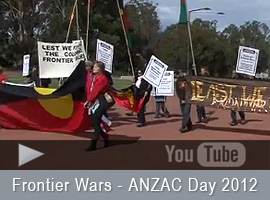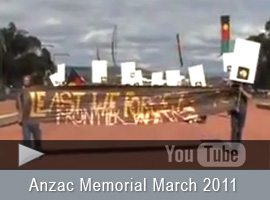Protest to recall Aboriginals deaths in the Frontier Wars

Frontier Wars Remembered
Anzac Day 2011 - Canberra
Greg Ansley NZ Herald 13th April 2012
Indigenous activists plan to join the national Anzac Day parade in Canberra to remember the thousands of Aborigines who died in Australia's "frontier wars" that extended from the 18th century into the 1930s.
Although condemned by veterans' groups as inappropriate, organisers are urging supporters to join the tail of the parade with banners naming battles and massacres, and protesting "the ongoing war of attrition against Aboriginal peoples".
A similar march was held last year without incident, but tensions have been increased by the violent Australia Day demonstration that saw Prime Minister Julia Gillard and opposition leader Tony Abbott rushed from a restaurant by bodyguards.
Michael Anderson, a founder of the Tent Embassy at the centre of the demonstration, said there would be no repeat on Anzac Day.
"Joining the Anzac march is not a protest," he said.
"It is a remembering of the [frontier] wars and the losses of those who suffered."
There is already a separate indigenous Anzac ceremony after the traditional dawn service at the National War Memorial, supported by the Returned and Services League and hosted by the Aboriginal and Torres Strait Islander Veterans and Services Association.
The ceremony was organised to remember 5000 indigenous soldiers who served in both World Wars, following anger that they had been forgotten and discriminated against after they returned home.
Separate indigenous Anzac services will also be held in the Sydney suburbs of Redfern and Blacktown.
Now supported by local politicians and councils, the services were launched several years ago. Organisers said that while indigenous soldiers were usually treated as equals while they were serving, many of their wives had been denied access to their pay while they were fighting overseas and their children had been taken.
After they returned, Aboriginal diggers in some towns were not allowed to march with white veterans on Anzac Day, many could not get veterans' health care, housing and other benefits, and the names of most were left off war memorials throughout Australia.
The planned Canberra march intends recognising battles fought within the country, and to seek wider recognition of conditions facing indigenous communities that include shorter life expectancy, poverty, unemployment, high imprisonment rates, poor housing and high rates of disease and other health issues.
Anderson said indigenous war service had shown Aborigines were prepared to defend Australia against enemies who threatened future generations.
But the Anzac Day march was part of a process to highlight the wars fought on Australian soil since 1788, when traditional lands were taken by superior force, at gunpoint.
"Those who stood in the way were shot," he said.
"What we need to do now is to keep identifying that there has been warfare, that blood has been spilt on the wattle, and there is an ongoing war of attrition against Aboriginal peoples to this day."
Anderson said the wars against indigenous Australians had been formalised when Governor Arthur Phillip arrived in 1788 as the first Governor of New South Wales "under the rules and disciplines of war".
In 1836, the British Parliament conducted an inquiry into military operations against Aboriginal peoples.
"We cannot forget this, because too many of our people lost their lives in defence of their country and people's lives continue to be lost," Anderson said.
"To march on Anzac Day and identify all this present aggression and past aggression, like we did last year, is an absolute imperative for us as no one is going to know what is going on unless we put it out there.
"The oppression that Aboriginal peoples are subjected to is now being internalised by our youth, many of whom don't see a future as Aboriginal people.
"But they don't want to assimilate, so they pay the ultimate price in the protest, by taking their own lives - 'turning off the sun'.
"Our people are dying in custody for crimes white people don't usually go to jail for, [such as] minor driving offences."
Anderson said the proposed constitutional reform process had rejected Aboriginal sovereignty as too hard to deal with, and control of indigenous lives through the Government's Closing The Gap policies was "social engineering at its best and genocidal in its intent, through assimilation".
Australia's Hidden Wars
Wars, battles and massacres between indigenous clans and British colonisers killed thousands in campaigns extending from the 18th century into the 1930s, including:
* The Hawkesbury and Nepean Wars, a guerilla campaign mounted by an alliance of indigenous NSW clans between 1790-1816, involving several conventional battles until being crushed by the massacre of sleeping Gundugara people.
* Tasmania's Black War of 1803-1830, notorious for mass killings that, with disease epidemics, all but exterminated the island's indigenous population and destroyed much of its language and culture.
* The Port Phillip District Wars in Victoria between 1830 and 1850, fought by local clans to resist colonists seizing their land.
* Queensland's Kalkadoon Wars from 1870 to 1890, killing about 900 Kalkadoon people fighting to defend traditional lands.
* The battle of Pinjarra in Western Australia, fought between about 80 indigenous warriors and a force of soldiers, police and settlers after the death of a white settler.



